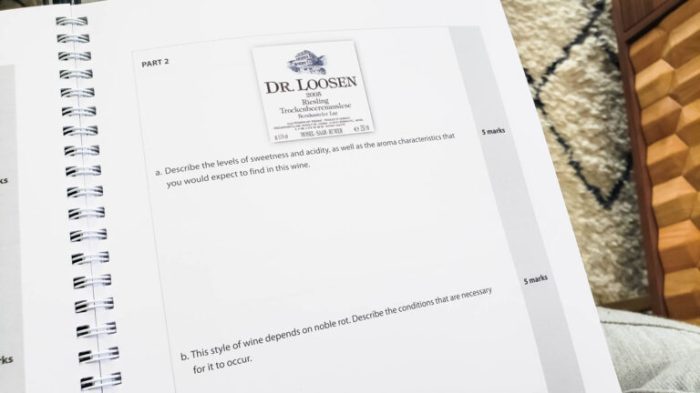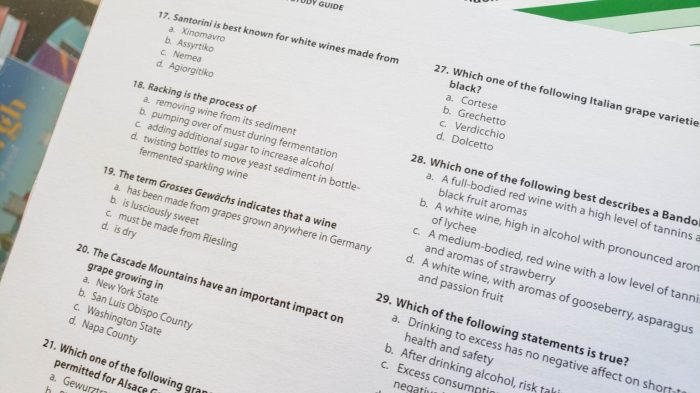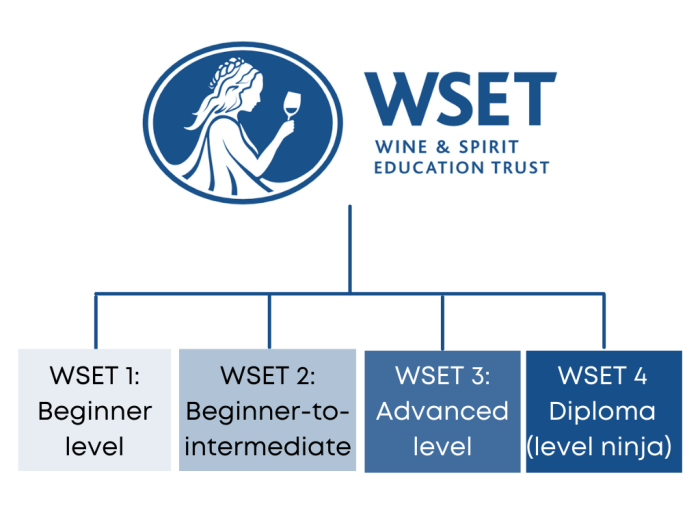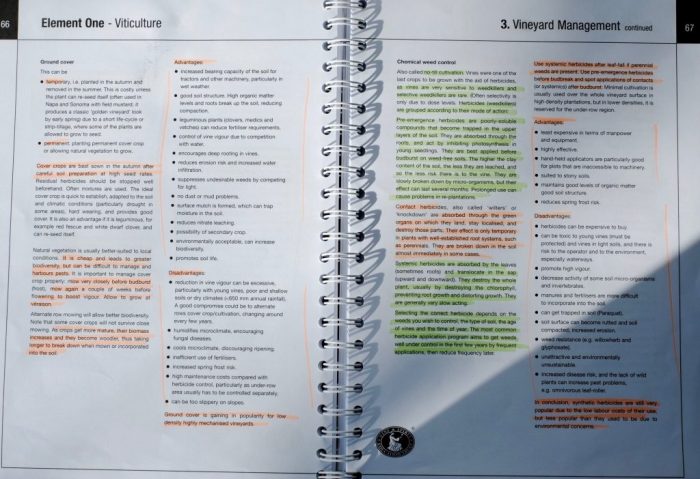Wset level 3 practice exam – Kick-starting your journey towards WSET Level 3 certification? Our comprehensive practice exam is your key to unlocking success. Dive into a world of wine knowledge, mastering key concepts and refining your tasting techniques with our expertly crafted exam simulator.
As you navigate the intricacies of wine regions, grape varieties, production methods, and tasting nuances, our practice exam serves as your trusted guide. Prepare to conquer the challenges of the actual exam with confidence and precision.
Introduction to WSET Level 3 Practice Exam

The WSET Level 3 certification is a globally recognized qualification that demonstrates a comprehensive understanding of wines and spirits. It is highly valued by wine professionals, sommeliers, and enthusiasts who seek to advance their knowledge and expertise in the industry.
The WSET Level 3 practice exam is an excellent resource for aspiring wine professionals seeking to deepen their knowledge. While studying for the exam, one might encounter the fern motif in wine labels or imagery. Understanding the symbolism of a fern, which represents resilience, growth, and new beginnings , can provide insights into the winemaker’s philosophy and the wine’s characteristics.
By exploring the connections between the natural world and the art of winemaking, the WSET Level 3 practice exam not only tests technical knowledge but also fosters a deeper appreciation for the multifaceted nature of wine.
Practice exams play a crucial role in preparing for the WSET Level 3 exam. They provide an opportunity to assess one’s understanding of the course material, identify areas for improvement, and build confidence in one’s ability to perform well on the actual exam.
Benefits of Using Practice Exams, Wset level 3 practice exam
- Assess understanding of course material
- Identify areas for improvement
- Build confidence in exam performance
- Familiarize with exam format and question types
- Manage time effectively during the exam
Key Concepts Covered in the Exam

The WSET Level 3 practice exam delves into the intricacies of winemaking and viticulture, encompassing a wide range of topics that test candidates’ knowledge and understanding of the industry.
The exam assesses individuals’ grasp of various wine regions, grape varieties, wine production techniques, and tasting methodologies, providing a comprehensive evaluation of their proficiency in the field.
Wine Regions
Candidates must demonstrate a thorough understanding of the major wine regions around the world, including their climates, soils, and the specific grape varieties grown in each region. They should be able to identify the unique characteristics and styles of wines produced in different areas, recognizing the influence of terroir on wine quality.
Grape Varieties
The exam also evaluates candidates’ knowledge of a wide range of grape varieties, both red and white. They should be able to describe the characteristics of each variety, including its flavor profile, aroma, and suitability for different wine styles. Additionally, candidates should understand the role of blending different grape varieties to create complex and balanced wines.
Wine Production
The practice exam assesses candidates’ understanding of the various stages involved in wine production, from grape growing to bottling and aging. They should be able to explain the impact of different viticultural practices, such as pruning, trellising, and canopy management, on the quality of the grapes.
Additionally, candidates should be familiar with the different winemaking techniques, such as fermentation, maceration, and oak aging, and how they influence the final character of the wine.
Tasting Techniques
The exam places significant emphasis on candidates’ tasting abilities. They should be able to accurately describe the appearance, aroma, and flavor of wines, using appropriate tasting terminology. Candidates should also be able to identify the different components of a wine, such as acidity, tannins, and sweetness, and assess the wine’s overall balance and quality.
Types of Questions and Formats

WSET Level 3 practice exams feature a range of question formats, each designed to assess different aspects of the candidate’s knowledge and skills.
Multiple Choice Questions
Multiple-choice questions present candidates with a stem (a question or statement) and several answer options. Candidates must select the single best answer from the options provided. These questions typically test factual knowledge and understanding of key concepts.
Scoring: Each correct answer is typically worth 1 point.
Short Answer Questions
Short answer questions require candidates to provide concise, written answers to specific questions. These questions assess the candidate’s ability to recall and articulate information, as well as their critical thinking skills.
Scoring: The scoring criteria for short answer questions vary depending on the exam, but generally include factors such as accuracy, completeness, and clarity.
Essay Questions
Essay questions are open-ended and require candidates to demonstrate their knowledge and understanding of a topic by writing a structured and coherent response. These questions assess the candidate’s ability to analyze, evaluate, and synthesize information.
Scoring: Essay questions are typically scored on a rubric that considers factors such as organization, content, and writing style.
Strategies for Success

Approaching the WSET Level 3 practice exam requires a well-thought-out strategy. Effective time management, strategic question selection, and refined answering techniques can significantly enhance your performance.
Time management is crucial. Allocate time wisely for each section, ensuring sufficient time for all questions. Prioritize questions based on your strengths and areas where you feel more confident. Attempt easier questions first to build momentum and confidence.
Question Selection
Carefully review each question before answering. Identify the key concepts being tested and determine the type of response required. If unsure about a question, flag it and return to it later. Do not waste time on questions you cannot answer immediately; move on to others and come back to them if time permits.
Answering Techniques
Answer questions clearly and concisely, using specific examples and evidence to support your responses. Avoid vague or general statements. If asked to provide a definition, ensure it is precise and comprehensive. For essay-type questions, organize your thoughts into a logical structure, providing a clear introduction, body paragraphs, and conclusion.
Resources and Support

The WSET Level 3 exam requires thorough preparation, and various resources are available to support your studies.
Online Platforms
- The WSET website provides access to study materials, practice questions, and online courses.
- Third-party platforms like Udemy and Coursera offer comprehensive video courses and study materials.
- Social media groups dedicated to WSET Level 3 can provide a platform for discussions and support.
Study Groups
- Forming or joining a study group with fellow students allows for peer-to-peer learning and knowledge sharing.
- Group discussions can help clarify concepts, reinforce understanding, and identify areas for improvement.
- Regular study sessions can provide motivation and accountability.
Professional Development Courses
- Wine schools and educational institutions offer in-person or online courses tailored to WSET Level 3 preparation.
- These courses typically cover the syllabus in greater depth and provide opportunities for practical tastings.
- Professional instructors can offer guidance, support, and personalized feedback.
Popular Questions
What topics are covered in the WSET Level 3 practice exam?
Our practice exam encompasses the major areas tested in the actual WSET Level 3 exam, including wine regions, grape varieties, wine production, and tasting techniques.
What types of questions can I expect in the practice exam?
You’ll encounter a variety of question formats, such as multiple-choice, short answer, and essay questions, mirroring the actual exam experience.
How can I use the practice exam effectively?
Treat the practice exam as a simulated test environment. Time yourself, answer questions thoughtfully, and review your performance to identify areas for improvement.